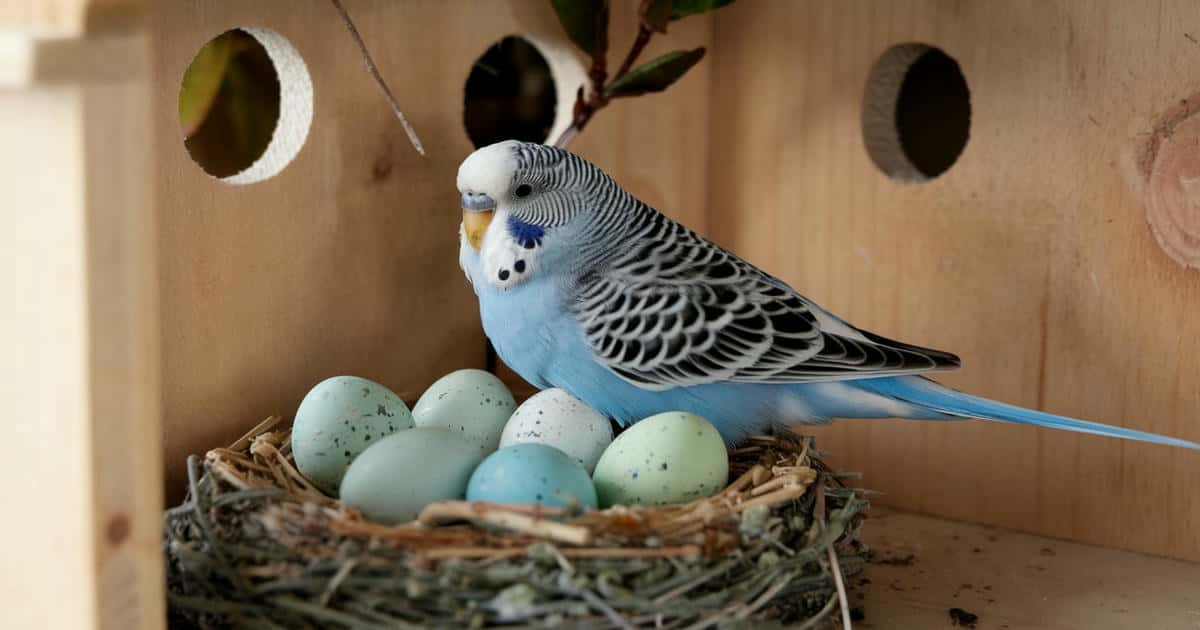How Long Do Budgies Sit On Eggs?
Budgies typically sit on their eggs for 18 to 21 days. This time frame starts when the hen begins consistent incubation, ensuring all eggs hatch around the same time. During this period, the hen keeps the eggs warm while the male provides food and protection.
As a long-time budgie owner and wildlife enthusiast, I’ve often marveled at how these small yet resilient birds care for their eggs.
Understanding how long budgies sit on their eggs is essential for anyone looking to breed healthy chicks or simply curious about their natural behaviors.
This guide thoroughly explores the incubation process, offering insights and practical tips to support your feathered friends.
How Long Do Budgies Sit on Eggs?
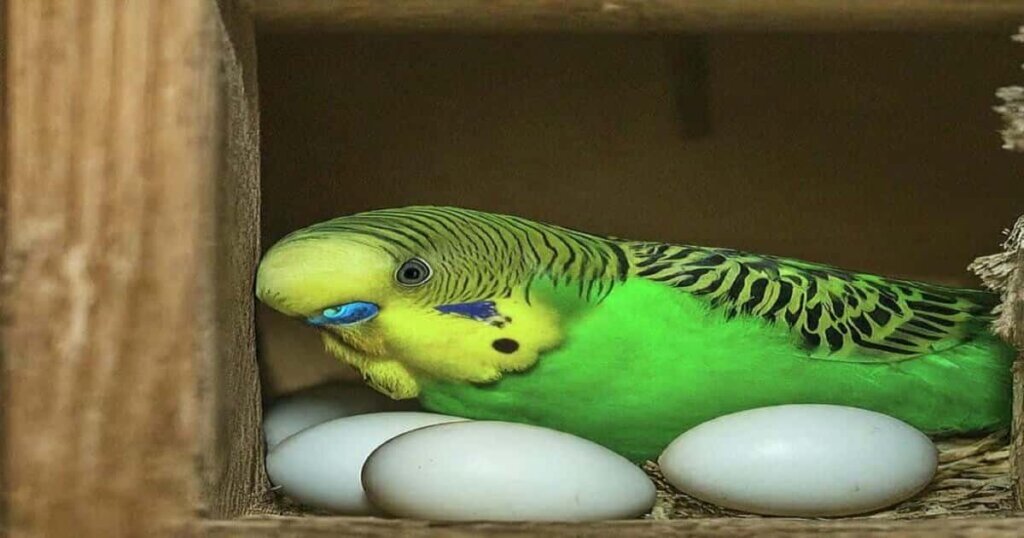
Budgies generally incubate their eggs for 18 to 21 days, starting once the female begins consistent incubation.
Although eggs are laid every 1–2 days, incubation typically starts after the second or third egg to synchronize hatching.
Quick Facts:
- Incubation Period: 18–21 days.
- Egg-Laying Interval: Every 1–2 days.
- Purpose of Synchronized Hatching: Ensures chicks are close in age and minimizes sibling competition.
If incubation extends beyond 23 days, the eggs are likely infertile or unviable. Read more about dead Budgie egg.
What Happens During the Incubation Period?
The incubation period is critical for healthy chick development. Here’s what happens:
Hen’s Responsibilities:
- Stays in the nest box, leaving only briefly for food, water, or to stretch.
- Rotates eggs regularly to maintain even temperature and prevent embryos from sticking to the shell.
Male’s Role:
- Feeds the hen regularly to ensure she remains focused on incubation.
- Guards the nest area, especially if other birds are nearby.
Temperature Details:
Budgies maintain the eggs at an average temperature of 37°C (98.6°F). Fluctuations can harm embryo development, so a stable environment is crucial.
You can also read the more informative article – are budgie eggs edible?
How Many Eggs Do Budgies Lay?
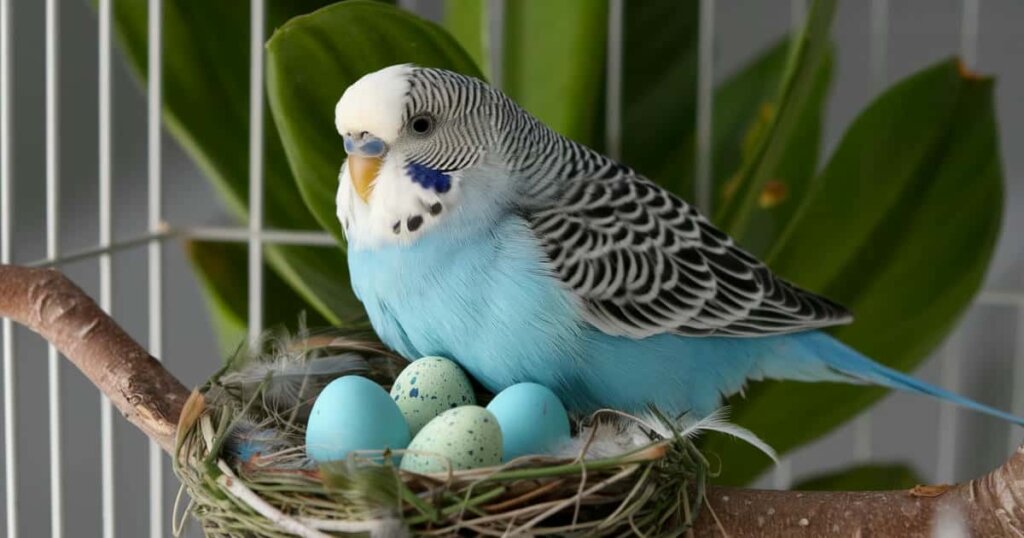
Budgies typically lay between 4 and 6 eggs per clutch, though the range can vary from 2 to 8 eggs.
Example Timeline:
- Day 1: First egg laid.
- Day 3: Second egg laid.
- Day 5: Third egg laid.
Chicks often hatch in the same sequence as the eggs were laid. This staggered hatching helps give each chick a fair start.
How to Tell If Budgie Eggs Are Fertile
Checking for fertility early helps manage expectations. The best method is candling, which uses light to examine the egg’s interior.
Steps for Candling:
- Wait 7–10 days after incubation starts.
- In a dark room, shine a small flashlight through the egg.
- Look for the following:
- Fertile Eggs: Blood vessels or a dark embryo.
- Infertile Eggs: Clear with no visible structures.
Pro Tip: Handle eggs gently to avoid cracks. If unsure, leave eggs with the hen until the incubation period ends.
Common Problems During Budgie’s Incubation
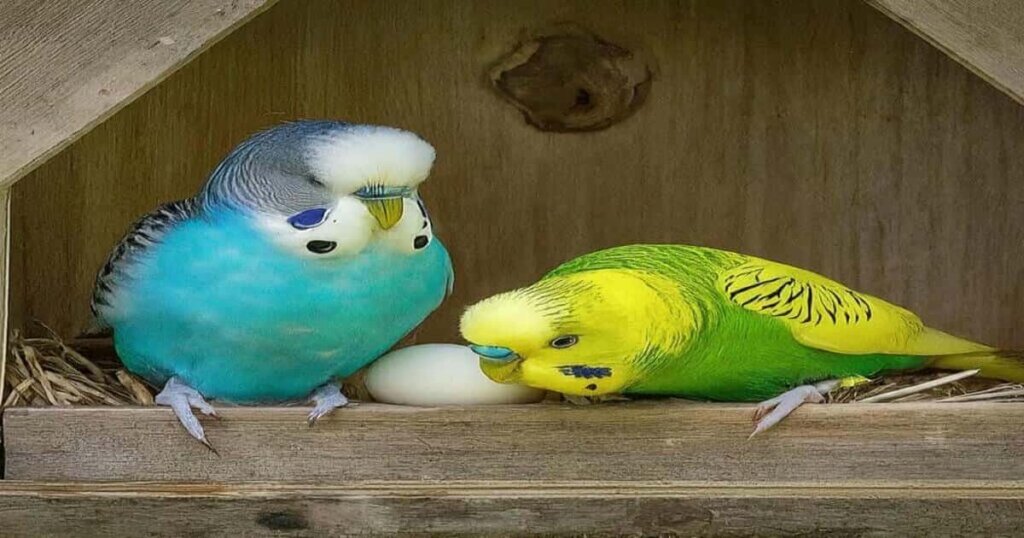
While budgies are excellent parents, some issues can arise. Here’s how to address them:
| Problem | Cause | Solution |
|---|---|---|
| Eggs Not Hatching | Infertility or temperature instability | Maintain stable nest temperature. Ensure both parents are healthy. |
| Hens Abandoning Eggs | Stress, illness, or inexperience | Minimize noise and disturbances. Provide a stable nest box setup. |
| Cracked Eggs | Poor nutrition leading to thin shells | Offer calcium-rich foods like cuttlebone, mineral blocks, or boiled eggs. |
Uncommon Issues and Solutions
- Aggressive Males: Some males may disturb the hen or harm the chicks. In such cases, separate the male temporarily and observe his behavior.
- Deformed Chicks: Occasionally, chicks may hatch with deformities due to poor genetics or lack of nutrients. Consult an avian vet if this occurs.
- Rejected Chicks: If a hen stops feeding a chick, you may need to hand-feed it using a syringe and special formula.
What to Expect After Hatching
Once the eggs hatch (see- budgie egg hatching chart), parental focus shifts to feeding and nurturing the chicks.
Tips for Supporting Parents and Chicks:
- Diet: Provide soft, protein-rich foods like boiled eggs, sprouts, and vegetables.
- Hygiene: Clean the nest box regularly to prevent infections.
- Monitoring: Ensure all chicks are being fed and growing at a healthy rate.
Did You Know? Newborn budgies rely entirely on their parents and are fed crop milk, a nutrient-rich secretion both parents produce.
Why Some Eggs Don’t Hatch
Despite ideal conditions, not all eggs may hatch. Common reasons include:
- Infertility: The egg wasn’t fertilized during mating.
- Improper Incubation: Temperature fluctuations or poor egg positioning.
- Genetic Issues: Embryos fail to develop due to abnormalities.
What to Do with Unhatched Eggs: If an egg hasn’t hatched by day 23, it’s likely unviable. Remove it gently to avoid disturbing the nest.
How to Ensure Healthy Eggs and Chicks
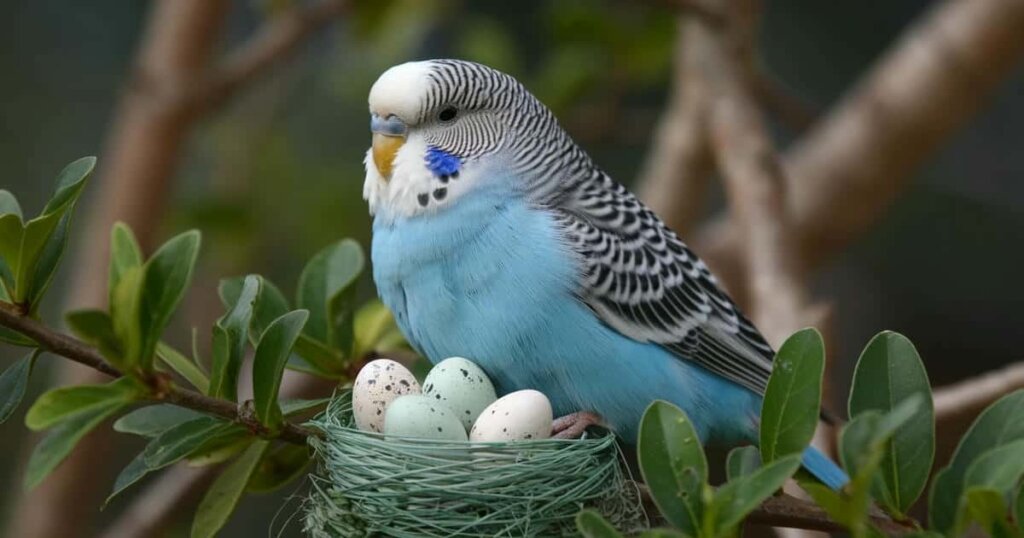
Follow these tips to support budgie parents and their eggs:
- Balanced Nutrition: Offer high-quality seeds, vegetables, and supplements like cuttlebone.
- Stable Environment: Keep the nest box in a quiet, undisturbed area.
- Frequent Observation: Check the hen and eggs daily, but avoid excessive handling.
Frequently Asked Questions And Answers
1. Can budgies lay eggs without a male present?
Yes, female budgies can lay eggs without a male, but these eggs will be infertile and won’t hatch.
2. What should I do if my budgie lays eggs on the cage floor?
Provide a proper nesting box to encourage safe egg-laying. If eggs are already laid on the floor, gently move them to the nesting box.
3. How can I tell if my budgie eggs are fertile without candling?
Without candling, determining fertility is challenging. Alternative methods include observing the hen’s behavior and waiting for the incubation period to conclude.
4. Is it normal for budgies to abandon their eggs?
Occasionally, especially if the hen is young or stressed, ensure a calm environment and proper nutrition to encourage consistent incubation.
5. How often should I check on my budgie’s eggs during incubation?
Limit disturbances to avoid stressing the hen. Brief, daily checks are sufficient to ensure everything is progressing well.
6. Is it safe to handle budgie eggs?
Minimize handling to prevent damage or contamination. If necessary, handle eggs with clean hands and utmost care.
Verdict
Budgies sitting on their eggs for 18–21 days is a delicate yet rewarding process. With proper care, you can support healthy incubation and chick development.
Enjoyed this guide? Please share it with other budgie lovers and help spread the joy of these amazing birds.
Thanks.
Hello Dear, I'm Poli Kolymnia, owner of many birds (including budgies).
With a deep passion for these feathered companions, I'm here to share my expertise and extensive knowledge on birds care.
My articles cover essential topics like diet, housing, care, and health, providing practical tips to help you create a happy and thriving environment for your birds.

